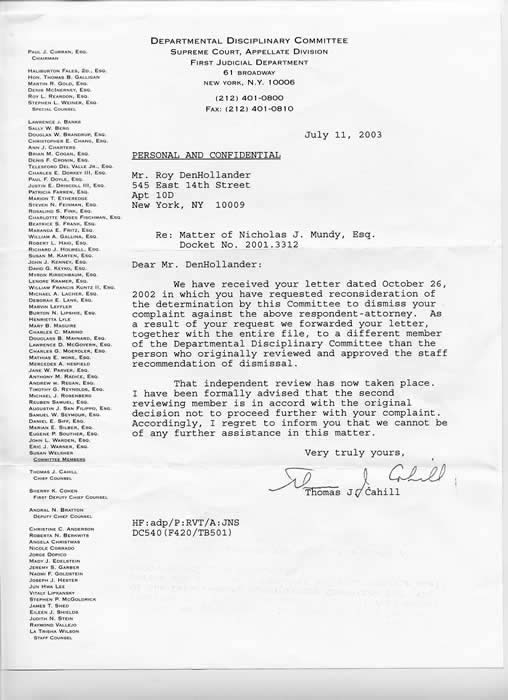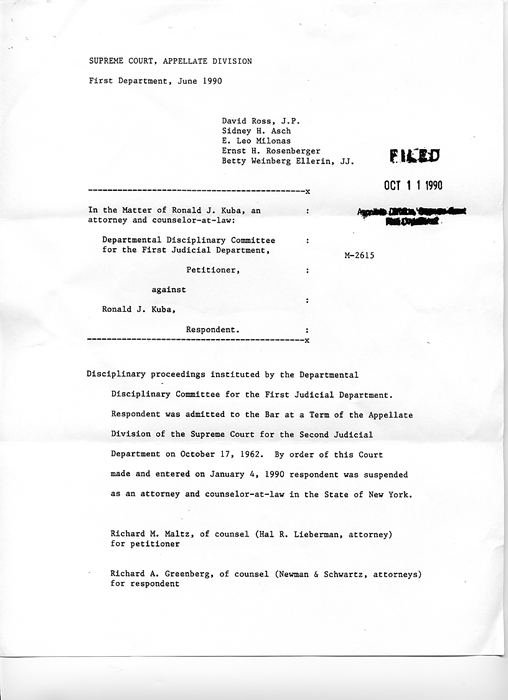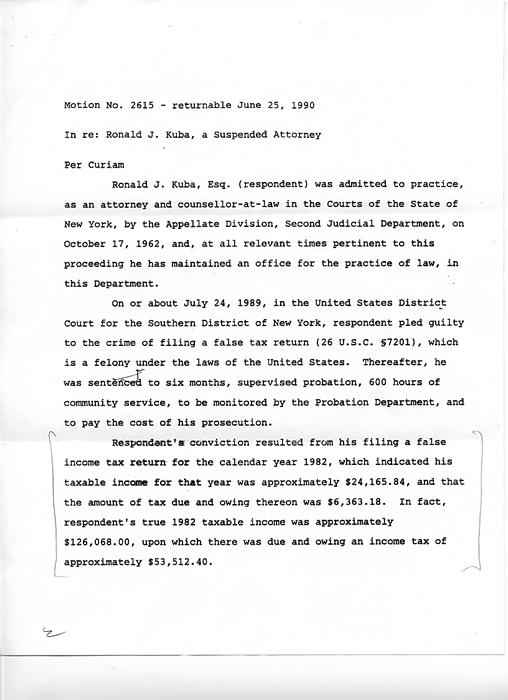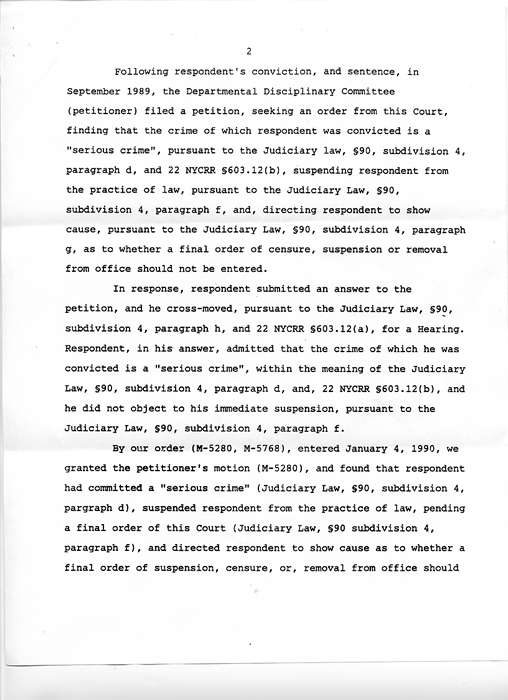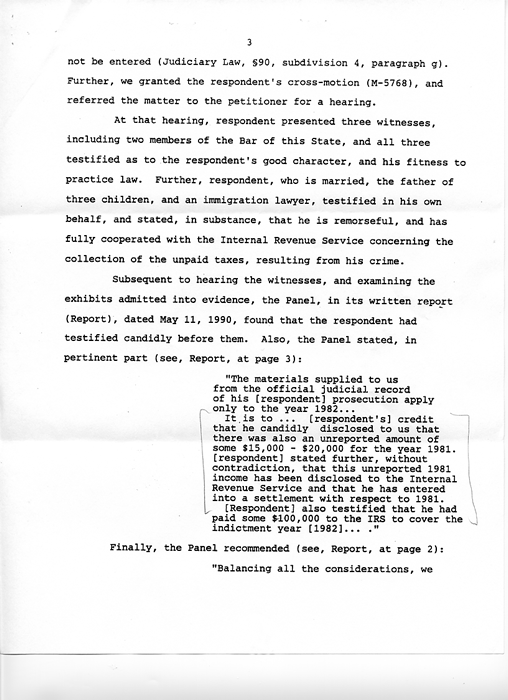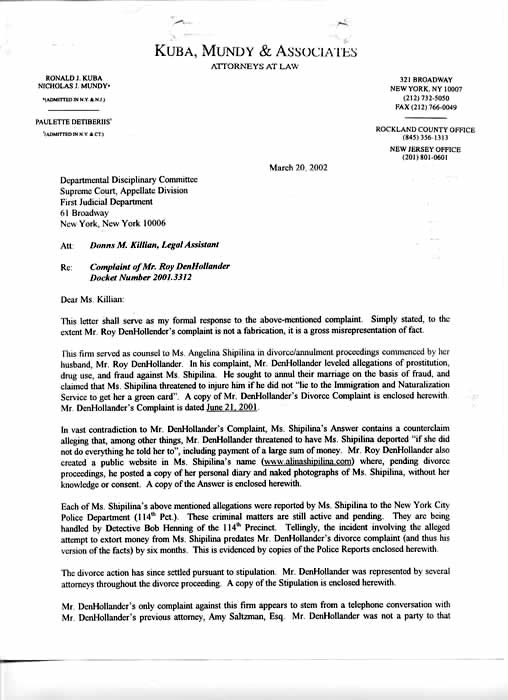
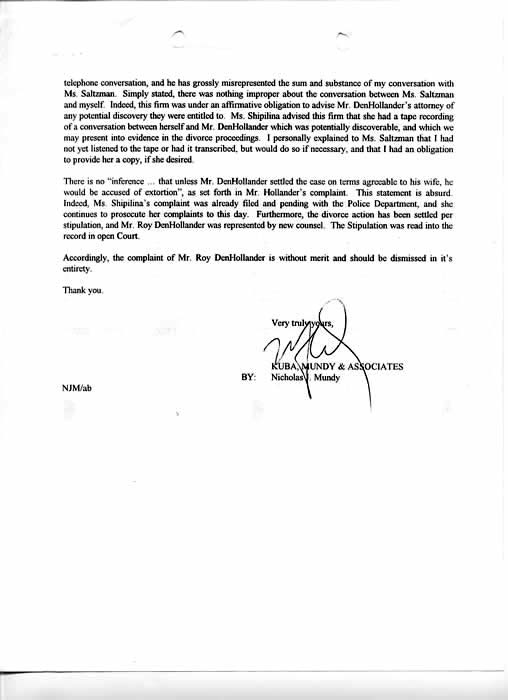
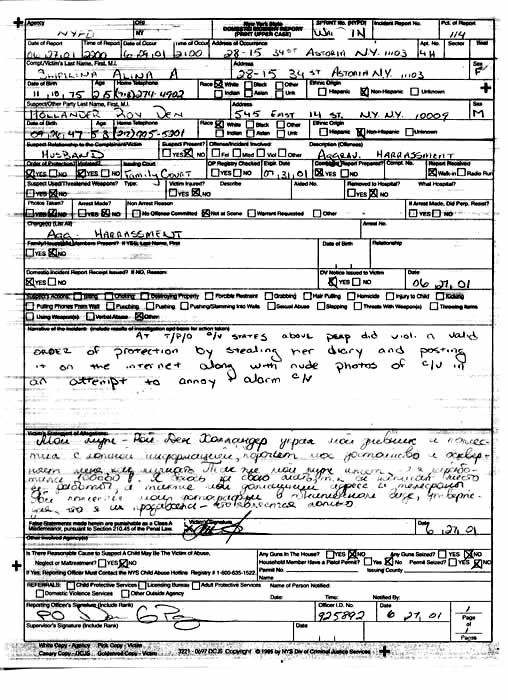
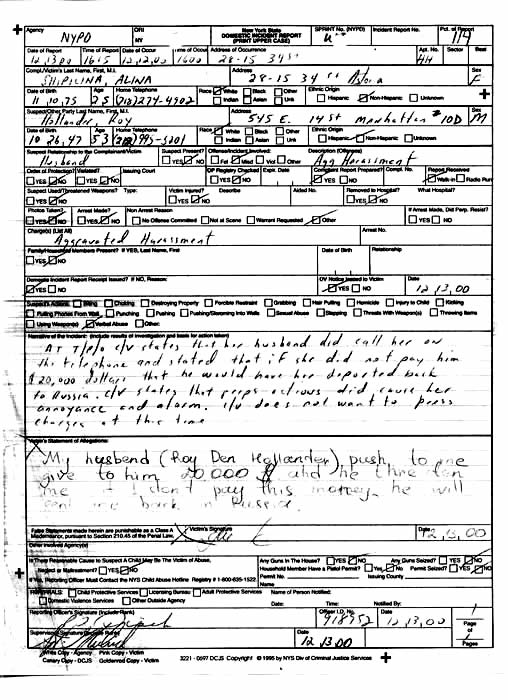
In the divorce and annulment proceedings of Roy Den Hollander v. Alina A. Shipilina, No.3500091/01, in the Supreme Court for New York County, Mr. Den Hollander was represented, in part, by Amy Saltzman of the firm Cohen Goldstein & Silpe (212 315 4400). Ms. Shipilina was represented, in part, by Nicholas J. Mundy of the firm Kuba, Mundy & Associates (212 732 5050).
Prior to the Preliminary Conference on July 26, 2001, and prior to receipt of Ms. Shipilina’s Answer, Ms. Saltzman had a telephone conversation with Mr. Mundy concerning possible settlement of the above action. During that conversation, according to Ms. Saltzman, Mr. Mundy accused Mr. Den Hollander of extortion and said that he possessed an audiotape of Mr. Den Hollander on which Mr. Den Hollander attempted to extort money from his then wife, Ms. Shipilina, by threatening to have her deported unless she paid him money. Ms. Saltzman became so upset by Mr. Mundy’s pronouncement that she notified her supervising partner, Steven Silpe, and the two immediately made a conference telephone call to Mr. Den Hollander. Mr. Silpe and Ms. Saltzman, both sounding upset, conveyed to Mr. Den Hollander that Mr. Mundy had accused Mr. Den Hollander of extortion, that Mr. Mundy had an audio tape of the attempted extortion and that the tape would be used at trial as part of the counterclaim of Ms. Shipilina. The clear inference to Mr. Den Hollander from Mr. Mundy was that unless Mr. Den Hollander settled the case on terms agreeable to his wife, he would be accused of extortion. Mr. Den Hollander immediately felt great fear that unless he settled the divorce case according to his wife’s wishes, he would soon be facing unfounded criminal charges in addition to a bitter divorce suit. Months later the case was subsequently settled on grounds previously opposed by Mr. Den Hollander.
It is not only a violation of the Code of Professional Conduct but also of New York State Penal Code 135.60 on coercion or attempted coercion for an attorney to instill fear in an opposing party in a civil litigation by accusing that party of criminal wrong doing in order to induce that party into reaching a settlement favorable to the accusing attorney’s client.
Mr. Mundy also violated the Professional Code of Responsibility sometime in March 2001 when, according to Mr. Den Hollander’s original attorney in this matter, Judith Bader-York (212 688 9020), Mr. Mundy falsely told Ms. Bader-York that he possessed medical records that showed Mr. Den Hollander had repeatedly battered his wife. No such genuine records exist.
Attached are copies of the Complaint and Answer in the divorce/annulment proceedings.
Thank you for your time.
Sincerely,
Roy Den Hollander
December 21, 2001




ROY DEN HOLLANDER
545 East 14th Street Tel. & Fax: (212) 995-5201
New York, NY 10009 Mobile 917 687 0652
March 30, 2002
Departmental Disciplinary Committee
Supreme Court, Appellate Division
First Judicial Department
61 Broadway
New York, NY 10006
Att: Donna M. Killian
Re: Matter of Nicholas J. Mundy, Esq.
Docket No 2001.3312
Dear Ms. Killian:
This letter serves as my response to Nicholas J. Mundy’s answer in the above-mentioned disciplinary matter. To the extent that Mr. Mundy’s answer does not labor on irrelevancies, it is a gross dissemblance. Mr. Mundy spends much of the beginning of his response rehashing old allegations, reciting extraneous matters and making false inferences in an effort to paint Mr. Den Hollander , the complainant, in a negative light. An unfortunate but often used tactic of lawyers.
On the merits, Mr. Mundy completely ignored the allegation that he lied to the complainant’s attorney, Judith Bader-York, by claiming to possess genuine medical records that showed the complainant battered his wife. Mr. Mundy’s omission of a response can only mean that he admits this allegation.
The only allegation Mr. Mundy did address was his violation of the New York State Penal Code 135.60 when he instilled fear in Mr. Den Hollander by accusing him of criminal wrong doing and inferring exposure of an asserted fact injurious to Mr. Den Hollander in order to induce him into reaching a settlement favorable to Mr. Mundy’s client, Alina Shipilina. Mr. Mundy made the communication to Mr. Den Hollander’s attorney, Amy Saltzman, knowing full well that Ms. Saltzman would inform her client about it.
Mr. Mundy’s specious response to this allegation ignores a number of facts:
1. Mr. Mundy states that his client, Ms. Shipilina, filed a complaint of attempted extortion against Mr. Den Hollander on December 13, 2000, well before Mr. Mundy’s conversation with attorney Amy Saltzman about an audiotape evidencing the alleged extortion attempt. The false implication Mr. Mundy creates is that he could not have inferred that criminal charges would be brought against Mr. Den Hollander because Ms. Shipilina had already brought them. However, Ms. Shipilina’s complaint, called a “Domestic Incident Report”, states at the end of the section “Narrative of the Incident” that Ms. Shipilina “does not want to press charges at this time.” So in truth, when Mr. Mundy discussed with Amy Saltzman the alleged extortion attempt, no criminal charges had been instituted. Mr. Mundy conveniently failed to note this fact.
2. Mr. Mundy misleading infers that the alleged extortion complaint was not connected to the divorce/annulment proceedings because the divorce/annulment complaint was not filed until six months later. Once again Mr. Mundy omitted crucial facts. Mr. Mundy’s firm began representing Ms. Shipilina on both immigration and marital matters in October 2000. By December 2000, it was clear that his client would most likely be involved in a contested divorce. A contested divorce might raise issues that could hinder his client, a Russian alien who grew up in Chechnya, from becoming a permanent United States resident. In preparation for a divorce suit, Mr. Mundy evidently had his client file the Incident Report but held off on having her institute criminal charges against Mr. Den Hollander in order to strengthen his client’s bargaining position. If Mr. Mundy had instructed his client to institute the criminal charges in December 2000, then there would have been no club, if needed, with which to cow Mr. Den Hollander and his attorney into submission during divorce negotiations. Furthermore, any reasonable person, not to mention an experienced attorney, knows that contingency plans for a contested divorce begin long before the filing of the complaint or even the notice of action. In Den Hollander v. Shipilina preparation for a potential divorce case clearly began in Mr. Mundy’s office well before December 13, 2000, while formal proceedings commenced on February 13, 2001, and not, as Mr. Mundy falsely inferred, six months following the alleged incident of extortion. See attached Action For A Divorce.
3. Mr. Mundy also falsely states in his answer that Ms. Shipilina “continues to prosecute her complaints to this day.” As of the date of this response, no action has been taken on the alleged extortion attempt.
4. Mr. Mundy’s characterization of his telephone conversation with Ms. Saltzman is inconsistent with her description to Mr. Den Hollander immediately following the telephone call, which is stated in paragraph two of the complaint against Mr. Mundy. See attached copy of Complaint. It appears that Ms. Saltzman’s recollection and notes of the conversation, plus her statements made to her superior, Mr. Steven Silpe, would be useful to the Committee on this point.
5. Mr. Mundy’s explanation that discussion of the audiotape with Ms. Saltzman arose because of discovery seems unlikely since Mr. Mundy’s client had not yet filed an answer in the divorce/annulment case and the Preliminary Conference, which determines the extent of discovery in marital proceedings, had not yet been held.
Given Mr. Mundy’s actions and the communications made to Mr. Den Hollander by Ms. Saltzman and Mr. Silpe, Mr. Mundy clearly violated the following sections of Penal Code 135.60, which states:
A person is guilty of coercion in the second degree when he compels or induces a person to engage in conduct which the latter has a legal right to abstain from engaging in, or to abstain from engaging in conduct in which he has a legal right to engage, by means of instilling in him a fear that, if the demand is not complied with, the actor or another will:
(Paragraphs 1 through 3 and 6 through 8 omitted.)
4. Accuse some person of a crime or cause criminal charges to be instituted against him; or
5. Expose a secret or publicize an asserted fact, whether true or false, tending to subject some person to hatred, contempt or ridicule; or
9. Perform any other act which would not in itself materially benefit the actor but which is calculated to harm another person materially with respect to his health, safety, business, calling, career, financial condition, reputation, or personal relationships.
With respect to recent developments, an unsettling event occurred that raises a serious question as to whether Mr. Mundy is instigating his client to harass Mr. Den Hollander as a form of retaliation for Mr. Den Hollander filing a Disciplinary Complaint against Mr. Mundy. After receiving the Disciplinary Complaint in early March 2002, Mr. Mundy apparently instructed his client to resurrect a Domestic Incident Report dating back to June 27, 2001, alleging a violation of a Temporary Order of Protection against Mr. Den Hollander that was dismissed on July 31, 2001. The matter will end up in another court hearing even though the parties are divorced and the allegations in the report grew out of the divorce/annulment proceedings.
In addition, there is also a Temporary Order of Protection pending in the New York County Family Court, Docket O-03570/02, against Ms. Shipilina for enlisting a gentlemen, unknown to Mr. Den Hollander, but apparently known to the United States Federal Bureau of Investigation, for making threatening telephone calls to Mr. Den Hollander to prevent him from testifying in a potential deportation hearing against Ms. Shipilina. Mr. Mundy will most likely be representing Ms. Shipilina in that matter.
In conclusion, Mr.Mundy’s answer is without merit and disciplinary action against him should proceed.
Thank you for your time.
Very truly yours,
Roy Den Hollander
I refer to myself in the third person in order to make it easier in distinguishing the players.
Complaint filed against Peter Petrovich working as a paralegal at the firm of Kuba, Mundy and Associates
In October 2000, my then wife, a Russian immigrant, and I wanted to separate and divorce. She was concerned that either might negatively affect her chance to obtain permanent residency status from the United States Immigration and Naturalization Service. Seeking legal advice, we made an appointment with the law firm of Kuba, Mundy & Associates.
On October 30, 2000, my then wife, Alina Shipilina, and I met with Peter Petrovich, a paralegal for the law firm who worked under the supervision of attorney Nicholas J. Mundy. Despite Mr. Petrovich’s lack of a license to practice law in New York State, Mr. Petrovich proceeded to provide my wife and me legal advice.
Mr. Petrovich counseled that we enter into a legal separation agreement that would state our separation as beginning in January or February 2001 even though we intended and did actually separate in December 2000. He said the reason for the false date of the beginning of our separation was because, “It would look better to the INS.” According to Mr. Petrovich, our divorce would then become effective one year later. He further advised that with the separation agreement my then wife could still obtain permanent residency status provided I execute a sworn affidavit for the INS in which I would make false statements. I subsequently declined to make such an affidavit.
Mr. Petrovich’s legal advice to my then wife and me constituted practicing law without a license while working under the supervision of attorney Nicholas J. Mundy.
Dated: July 10, 2002
Roy Den Hollander
212 995 5201
917 687 0652
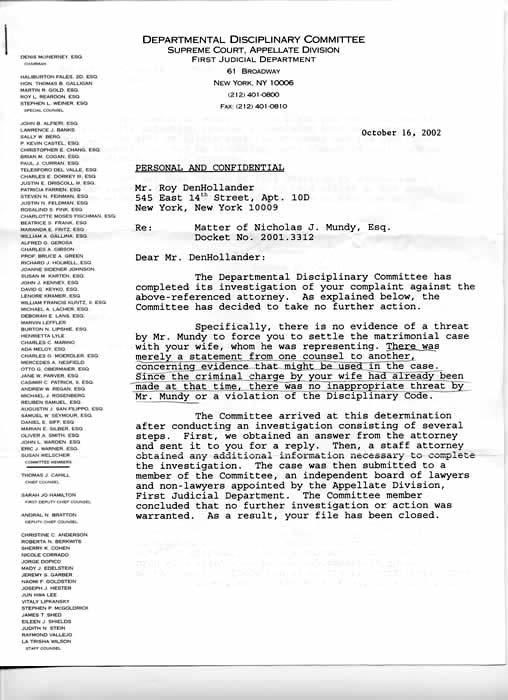
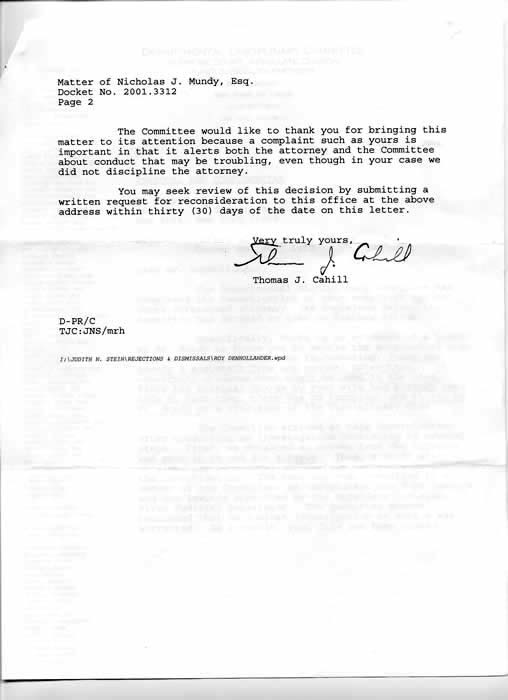
ROY DEN HOLLANDER
Attorney at Law
545 East 14th Street Tel. & Fax: (212) 995-5201
New York, NY 10009 Mobile 917 687 0652
October 26, 2002
Thomas J. Cahill
Departmental Disciplinary Committee
Supreme Court, Appellate Division
First Judicial Department
61 Broadway
New York, NY 10006
Matter of Nicholas J. Mundy, Esq.
Dear Mr. Cahill:
This is a request for review of the Committee’s decision in the above captioned matter and an additional complaint against Nicholas J. Mundy.
The Committee’s decision failed to address the second allegation in the original complaint filed against Mundy in December 2001:
“Mr. Mundy also violated the Professional Code of Responsibility sometime in March 2001 when, according to Mr. Den Hollander’s original attorney in this matter [Den Hollander v. Shipilina, No. 3500091/01], Judith Bader-York (212 688 9020), Mr. Mundy falsely told Ms. Bader-York that he possessed medical records that showed Mr. Den Hollander had repeatedly battered his wife. No such genuine records exist.” See Ex. 1, Complaint Against Nicholas J. Mundy.
This conduct by Mundy violated DR 1-102[1200.3] of the Code of Professional Responsibility because it involved deceit and misrepresentation, since no such medical records existed and no such battery ever occurred.
Mundy’s answer to the original complaint did not even address the above allegation as pointed out in the reply:
“On the merits, Mr. Mundy completely ignored the allegation that he lied to the complainant’s attorney, Judith Bader-York, by claiming to possess genuine medical records that showed the complainant battered his wife. Mr. Mundy’s omission of a response can only mean that he admits this allegation.” See Ex. 2, Reply to Mundy’s Answer.
In addition, Mundy’s statement to Bader-York constituted coercion in the second degree under New York Penal Law 135.60. Mundy’s clear inference to Den Hollander was that unless Den Hollander settled the case on terms agreeable to his wife, he would be accused of battery and face contempt or ridicule, or harm to his business, calling, career, financial condition or personal relationships by publication of that false statement. Mundy’s misrepresentation instilled fear in Den Hollander.
This attempted coercion by Mundy was not a mere statement from one counsel to another, concerning evidence that might be used in the case, since no such evidence existed. Nor were such charges by Den Hollander’s wife already made at the time of Mundy’s attempted coercion.
In conclusion, Mundy engaged in conduct involving deceit and misrepresentation in an attempt to coerce Den Hollander to abstain from an activity in which he had a legal right to engage.
Sincerely yours,
Roy Den Hollander
